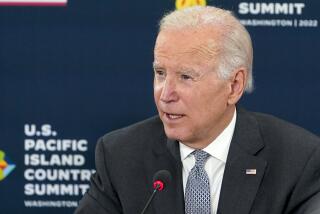Bush Tries to Soothe Pacific Fears on Weapons Dump : Diplomacy: He tells leaders of 11 island nations that the U.S. won’t use an atoll south of Hawaii as a permanent disposal site.
- Share via
HONOLULU — President Bush welcomed leaders from 11 Pacific island nations to a hastily called summit meeting in Hawaii on Saturday and sought to reassure them that his Administration will not turn a controversial chemical weapons incinerator south of Hawaii into a permanent hazardous waste site.
Island leaders said they were happy for the assurances, but they gave Bush a stern lecture about the importance of environmental protection.
“We are happy for the assurances that have been given,” said Cook Islands Prime Minister Geoffrey Henry, speaking for the 11 leaders. But, said Henry, the environment “is all we’ve got.”
“You’ve got the oil, you’ve got the gold. You’ve got all the minerals in the world. We in the Pacific have just the clear air that we have, the clear water that we swim in and fish in and eat out of. That’s all God . . . chose to give the people of this part of the world.”
Henry also chided the Administration for its go-slow approach toward global warming, a serious concern for leaders of countries that likely would disappear under the waves entirely if, as some scientists fear, sea levels rise as a result of a warming of the Earth’s climate.
The presence of a chemical weapons incinerator on Johnston Atoll, a small island about 800 miles southwest of Hawaii, has become a focal point for environmental concerns in the Pacific.
The U.S. military is shipping about 100,000 nerve-gas artillery shells from Germany to the atoll, which already holds about 300,000 chemical weapons shipped there from Okinawa and other Pacific points. The 100,000 shells en route represent about 3% of the U.S. chemical arsenal, Administration officials say.
Pacific leaders from Tarawa to New Zealand have objected to U.S. plans to store and incinerate chemical weapons on the atoll, fearing that the United States will use it as a permanent dump site rather than building chemical incinerators on the U.S. mainland.
“Don’t Make Our Pacific Your Cesspool,” urged a sign held by one of a group of about 100 demonstrators outside the University of Hawaii’s East-West Center, where the talks were held.
Bush rejected the idea of closing the site, saying that “our ability to move ahead and destroy chemical weapons is a significant step toward disarmament and peace.” He pledged, however, “stringent environmental controls” and promised that after the current shipment arrives early next month, no more weapons will be sent to the island from outside the Pacific.
“We have no plans to use Johnston Atoll for any other chemical munitions purpose,” such as destroying the large chemical stockpiles currently stored in the mainland United States, “or as a hazardous waste disposal site,” Bush said in a closed session of the summit meeting, according to a text of his remarks released by the White House.
Bush also pledged additional investment aid for the islands, saying he is aware that the crisis in the Persian Gulf has greatly increased their energy costs.
The Overseas Private Investment Corp., a government-funded agency designed to spur private investments overseas, will put $300 million into two funds for the Pacific islands, a $200-million venture capital fund and a $100-million environmental investment fund, Bush said. In addition, OPIC will organize a trip for American investors to Pacific island countries next year, he said.
Bush scheduled the meeting only a few weeks ago, tacking it onto a previously planned trip to Hawaii to campaign for Republican Senate candidate Pat Saiki. The hasty scheduling drew some skepticism from island leaders, but Henry said he viewed the meeting as a “good start.”
In addition to Henry, the summit was attended by government leaders from the Marshall Islands, the Federated States of Micronesia, Fiji, Western Samoa, Nauru, Tonga, the Solomon Islands, Tuvalu and Kiribati, which combined have a population of about 1.5 million, and Papua New Guinea with a population of about 3.5 million.
More to Read
Sign up for Essential California
The most important California stories and recommendations in your inbox every morning.
You may occasionally receive promotional content from the Los Angeles Times.














